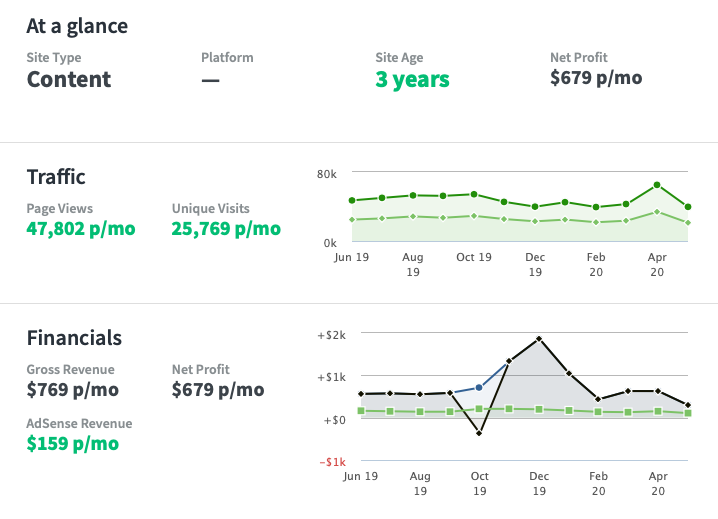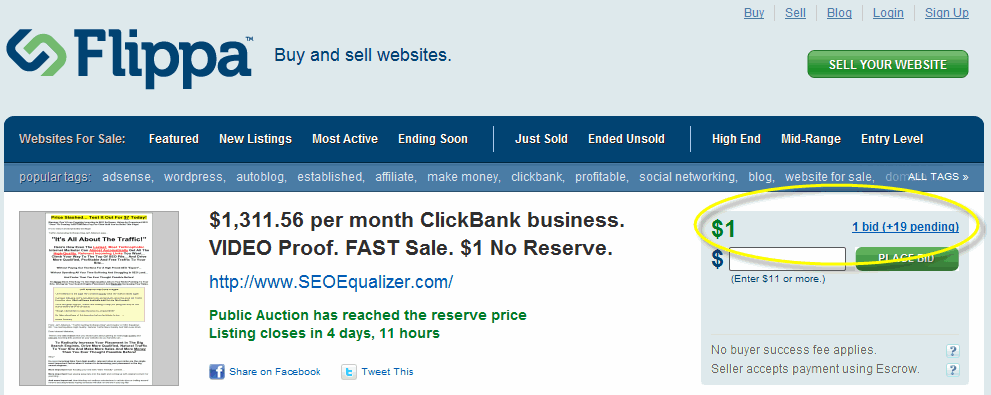Making money flipping websites is exciting and, thanks to Flippa, quite easy to do. Humans have been flipping things for profit ever since the Neanderthals started trading nicely shaped rocks for tattered loincloths, then patching up those loincloths and trading them for two nicely shaped rocks. Well, sort of. Websites are the loincloths of the 21st century. The barrier for entry is low, as anyone can learn how to build a basic website, and selling that website once its worth its weight in stones and arrows has never been easier thanks to Flippa, and perhaps most importantly, it’s a safe place to transact a large scale sale. Flippa is the number one marketplace for online businesses for sale. It attracts a huge audience, it’s extremely simple to use, offers great tools to increase your auction’s visibility. Interestingly, Flippa began as SitePoint’s very own SitePoint Marketplace before spinning off into its own company. Man we’re cool. If you’re willing to dedicate a little capital, a moderate amount of time and a lot of loincloths, flipping on Flippa can net you some serious coin. The platform has seen more than $140 million in sales since its 2009 launch. If you want to contribute to that number, heed the following advice.
Target a Niche
Before you invest a single cent into the endeavor, you need to decide what your website is going to be about. The overwhelming wisdom is to choose a highly-targeted niche, but don’t confuse highly targeted with widely popular. It’s all about creating content for a group of people who are hugely excited about a rather small idea. If you’re already passionate about, or have significant knowledge of, a niche topic, make that your starting point. If you live a Top 40 kind of life and niches just aren’t your thing, do some research and find a niche with potential. Carrot peeling techniques, nail clipper reviews, mouse pads made from recycled coffee cups – these are all valid niches to pursue, because they are highly targeted. Cornering a niche means cutting out a huge swath of competition. The mouse pad market might be crowded, but mouse pads made from recycled coffee cups? Open frontier, baby. But here’s the tricky part. While the niche should be highly targeted, it should also have a following. Your job isn’t to create an audience out of nothing, it’s to build a lighthouse for them to flock toward.Build vs. Buy
Now that you’ve chosen your niche, it’s time to secure a website. Should you build it, or buy it? Let’s look at what goes into each.Build It
Unless you’re a web developer, building a website is going to cost a few bucks. However, it probably won’t cost as much as buying an existing website. You can teach yourself of course, but if you need it done fast, you’re going to want to hire a developer. To find a cost-effective developer, look toward a platform such as Upwork or Fiverr. On either of these platforms, will find a database of freelancers looking for work. Once you post the job, qualified freelancers will click “I’m interested” so you can review their portfolio. Paying top dollar for a developer isn’t necessary when all you need is for it to function smoothly. You’re still going to have to shell out a few hundred dollars, but it is crucial your site has a solid foundation. It’s also smart to have your website built in WordPress. Buyers are typically more comfortable with WordPress sites and can better justify buying something they know how to use. You can even install Flippa’s WordPress plugin that will keep you up to date on your business valuation as your site starts to make a bit of money. Once you have a fully functioning website, you need content. After all, a nail clipper review site needs nail clipper reviews, so you’re going to want a healthy stream of keyword rich reviews with affiliate links. If you deem it worth your time, you can create some, or all, of the content yourself (there may be a downside to this which we’ll cover later). If not, you can head right back to Upwork or Fiverr to find writers for hire. Since competition is fierce here, you can probably hire someone for $5/500 words. That’s one heck of a deal! Alternatively, you could (and should) invest in higher quality writers, especially if you think that five buck writers are devaluing the writing profession as a whole. But that’s a topic for another time. When you have a solid chunk of content, refrain from posting it all at once. Instead, post couple of pieces each day. This improves SEO rankings and builds traffic. Remember, you want fat stats when it comes time to sell.Buy It
While buying an existing website may cost more, it does offer significant advantages. For one, it already has an established audience. It’s also already indexed within search engines. The key to buying a flippable website is to buy it for less than it’s worth. Neil Patel lays out three qualities you should look for in a website owner who might undersell.- The owner doesn’t update their site very often.
- The owner doesn’t seem to be making much money from the website.
- The owner doesn’t seem to care about the business.
- Earning Money From Your Website
- Getting Sites Recrawled
- Promoting On Facebook
- Boost Traffic and Conversions
Flipping Your Website On Flippa
When your website is seeing a healthy amount of traffic, engagement and financial potential, it’s time to sell it on Flippa (or resell it if you bought it there in the first place). Here are some tips for a successful auction.Create A Robust Description
According to one of Flippa’s own blog posts, many unsuccessful auctions on Flippa have very little information in the description. Wimpy descriptions reflect poorly on you and your website. A buyer might assume that a sparse description means a sparse website. They may think that if you couldn’t put the effort into writing a description, you probably didn’t put much effort into the website. Instead, create a comprehensive, well-written and professional-looking description to generate interest and inspire confidence.Include Statistics
 This may seem obvious, but the first thing a buyer is going to look for is your website’s stats, so make sure to include the most up-to-date metrics on page views, unique visitors, gross revenue, and net profit. Flippa automatically pulls your Google Analytics data during the registration process, making this part a breeze.
This may seem obvious, but the first thing a buyer is going to look for is your website’s stats, so make sure to include the most up-to-date metrics on page views, unique visitors, gross revenue, and net profit. Flippa automatically pulls your Google Analytics data during the registration process, making this part a breeze.
Don’t Be Anonymous

Be Responsive

Placate Buyers By Creating a Sustainable Product

Reach Out To Potential Buyers
Don’t rely on buyers to just stumble across your auction. You need to play an active role in recruiting them. If promoting through your social media and personal network isn’t enough, try finding and reaching out to new buyers. One strategy you can take is locating website owners in your niche. Domain Tools’ Domain Search is an excellent resource for such an occasion. Just type in the keywords relevant to your niche and Domain Search will populate a list with related websites. If your website is called NailClipperReviews.com and you see that someone owns ReviewsNailClippers.com, navigate to their Whois page and try contacting them. Maybe they’re interested in buying your website to generate more traffic. Maybe they want to buy your website to eliminate the competition.Conclusion
Flipping websites on Flippa isn’t something you can do overnight, but if you invest the time and energy, you could turn a sizable profit. Remember to build or buy a niche website and grow it until it’s either profitable or has profit potential. When auctioning on Flippa, promote the heck out of it using all available channels and earn the buyers’ trust by remaining transparent.Frequently Asked Questions about Flipping Websites on Flippa
How does Flippa compare to other website marketplaces?
Flippa is one of the most popular platforms for buying and selling websites, domains, and apps. It offers a user-friendly interface and a wide range of listings, from starter sites to established businesses. Compared to other marketplaces like Empire Flippers or Upwork, Flippa provides a more diverse range of options in terms of price and business type. However, due diligence is essential as Flippa’s listings can vary greatly in quality.
What are the risks involved in buying websites on Flippa?
Like any investment, buying websites on Flippa comes with its own set of risks. These include overpaying for a site, buying a site with inflated traffic or revenue figures, or purchasing a site that requires more work than you can handle. It’s crucial to conduct thorough research and due diligence before making a purchase.
How can I ensure a successful transaction on Flippa?
To ensure a successful transaction on Flippa, it’s important to communicate effectively with the seller, verify all information provided, and use Flippa’s Escrow service for secure payment. It’s also recommended to seek legal advice for larger transactions.
Can I sell my website on Flippa if it’s not making any money?
Yes, you can sell websites on Flippa regardless of their current revenue. However, websites with proven income tend to sell for higher prices. If your site isn’t making money, you’ll need to highlight its potential for growth to attract buyers.
How do I determine the value of my website for sale on Flippa?
The value of a website is typically determined by its monthly revenue, traffic, growth potential, and other factors like the niche it operates in. Flippa provides a valuation tool that can help you estimate your site’s worth.
What are the fees for selling a website on Flippa?
Flippa charges a listing fee and a success fee when your website sells. The listing fee varies depending on the type of asset you’re selling, while the success fee is a percentage of the final sale price.
How long does it take to sell a website on Flippa?
The time it takes to sell a website on Flippa can vary widely. Some sites may sell within a few days, while others may take several months. It largely depends on the quality of your listing and the demand for websites in your niche.
Can I buy a website on Flippa and flip it for a profit?
Yes, many people buy underperforming websites on Flippa, improve them, and then sell them for a profit. However, this requires a good understanding of website optimization and online marketing.
How can I avoid scams when buying a website on Flippa?
To avoid scams, it’s important to verify all information provided by the seller, use Flippa’s Escrow service for secure payment, and consider seeking legal advice for larger transactions.
What kind of support does Flippa offer to buyers and sellers?
Flippa offers a range of support options, including a comprehensive Help Center, a dedicated support team, and a community forum where users can share advice and experiences.
 Joshua Kraus
Joshua KrausJosh Kraus is a Chicago-born, Denver-based writer and mediocre autobiographist with an interest in art, entrepreneurship, and emerging industries. When he's not writing, he attends to his t-shirt business, Bird Fur. Find him at joshkra.us and birdfurtees.com.


